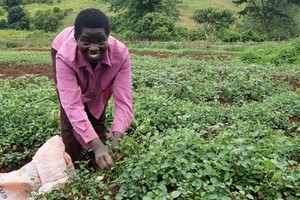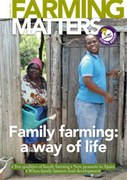The area around Wum in the Northwest Province of Cameroon is notorious as a conflict hotspot. As pressure increases on available land, conflicts occur more frequently between sedentary family farmers and pastoral communities. Both groups have too little land for crop and livestock production, which seriously threatens their farming systems, animals and livelihoods. Farmer-pastoralist alliances are helping to resolve the conflicts by transforming the relationships between these families.
Farming and pastoral families in Wum Central Sub-Division have both used the land since time immemorial. However the customary tenure system is increasingly being overruled by the costly, cumbersome and corrupt land tenure law, under which it is difficult for poor farmers and pastoralists to secure their land rights legally. Farming and pastoralist families can be suddenly evicted from what is overnight be referred to as “state land”. In the Wum area, the relatively recent introduction of a growing industrial tea estate has made land grabbing, exclusion and conflicts a new and growing reality for family farmers and pastoralists.
Two groups, one land
Arable farmers in this region generally cultivate a plot of land until low soil fertility forces them to move to a new plot. Pastoralists, in their attempts to cope with unreliable rainfall patterns, move their livestock seasonally from one grazing ground to another. While in the past these systems co-existed in harmony, more recently they have been breaking down with violent conflicts ensuing. Access to land for both groups was at the centre of these conflicts. The farmers’ perceptions about their entitlement to land and the pastoralists’ relative wealth and power have made it difficult for the two communities to resolve these conflicts between themselves. Their increasingly extreme positions meant that an outside party was needed to create a dialogue between both parties and to stimulate a process of change.
In 2007, SNV Netherlands Development Organisation started to work with these farmers and pastoralists, developing an approach to conflict resolution based on dialogue at the community level. Involving local councils, nine “farmer-pastoralist platforms” in nine conflict-prone villages in the Wum area were created. These platforms bring together representatives of the farming and pastoralist communities and traditional leaders. They discuss peaceful solutions and make annual plans that regulate which crop and livestock activities will occur where and when. In total, over 40 dialogue platforms have been created in eleven subdivisions in Cameroon.
Farming alliances
An SNV study showed a 65% reduction in conflicts between 2007 and 2010 in Wum. This is because the farmer-pastoralist platforms foster the emergence of mutually beneficial farming alliances rather than conflicts that degenerate into uncontrollable situations. These alliances constitute a farming partnership between a pastoralist family and one or more farm families under which the pastoralists’ animals are permitted onto arable land after the harvest. The pastoralist family benefits because the animals feed freely off the crop residue. The farm family benefits from the animals’ manure: arable farms are fertilised, allowing farmers to cultivate the same land without losing fertility. At other times of the year, animals stay in jointly defined grazing areas.
Based on settlement patterns and geographical parameters, different variations of the basic farming alliance concept have evolved. Local organisations and leading farmers and pastoralists now promote the approach. Access and management of pastoral resources through farming alliances has also found its way into the new national legal texts such as the Pastoral Code of Cameroon.
Better crops and healthier animals
Farmer Delphine Fuh and pastoralist Sheffu Mohamadu of Naikom village, one of the villages in Wum Central Sub-Division, have been collaborating in a farming alliance since 2010. Delphine notes, with much excitement, that whereas her family used to force pastoralists from their land, today she and other farmers invite them to come onto their land. Delphine tells how her maize production has doubled, and her vegetable production tripled. At the same time she saves money as she no longer needs to buy chemical fertilizer because her land is fertilised by the livestock. And she sees the results in the quality of her produce. “Each time we harvest our vegetables my neighbours come and pay me in advance because of the exceptionally good quality and taste of my vegetables.” Delphine points out that there are seven new initiatives for farming alliances emerged in her neighbourhood; all because of the successful alliance between her and Sheffu’s families.
On his side, Sheffu recounts how his animals are now much healthier because they have access to the crop residue and fresh pasture that grows just after the harvest. He spends less money on buying food for his family and herdsman because Delphine gives him access to her maize and vegetables. Sheffu has secured his grazing land from encroachment by arable farmers who used to claim more and more rights, referring to themselves as “natives” and him and the other pastoralists as “strangers”. “Although I have already lost part of my land to farmers, I am overwhelmed by the fact that ever since we started our farming alliance they are no longer demanding additional land. Not only can I bring my cattle to their farms, the farmers have also opened up tracks giving my cattle access to drinking points. ”
Stronger families
This experience of farmer-pastoralist alliances highlights three key areas for strengthening family farming: tenure security, conflict management and sustainable farming practices. It shows how both farming and pastoralist families can make a difference in the wider community. Dialogue creates an enabling environment for crop and livestock integration, replacing the barriers that existed before. The use of cow dung to fertilise arable land is one of the ways in which alliance farming helps pastoralist and farm families adopt more sustainable approaches. Also, farmers no longer have to resort to shifting cultivation and slash-and-burn, helping them to improve soil fertility.
The farmer-pastoralist alliances not only avoid conflict, but also lead to tenure security between farmers and pastoralists and within communities. It also promotes tenure security as a whole: where dialogue platforms are stronger the rural communities, including both farmers and pastoralists, stand united against activities of large investors. Development organisations in the North West Region, such as the Mbororo Social and Cultural Development Association (MBOSCUDA) are currently promoting dialogue platforms in order to strengthen community land rights for pastoralists and arable farmers and protect them from land grabbing.
Author
Charles Kacho Tah has been working with SNV since 2010 to improve pastoral livelihoods in the North West Region of Cameroon. E-mail: ckachotah@snvworld.org


